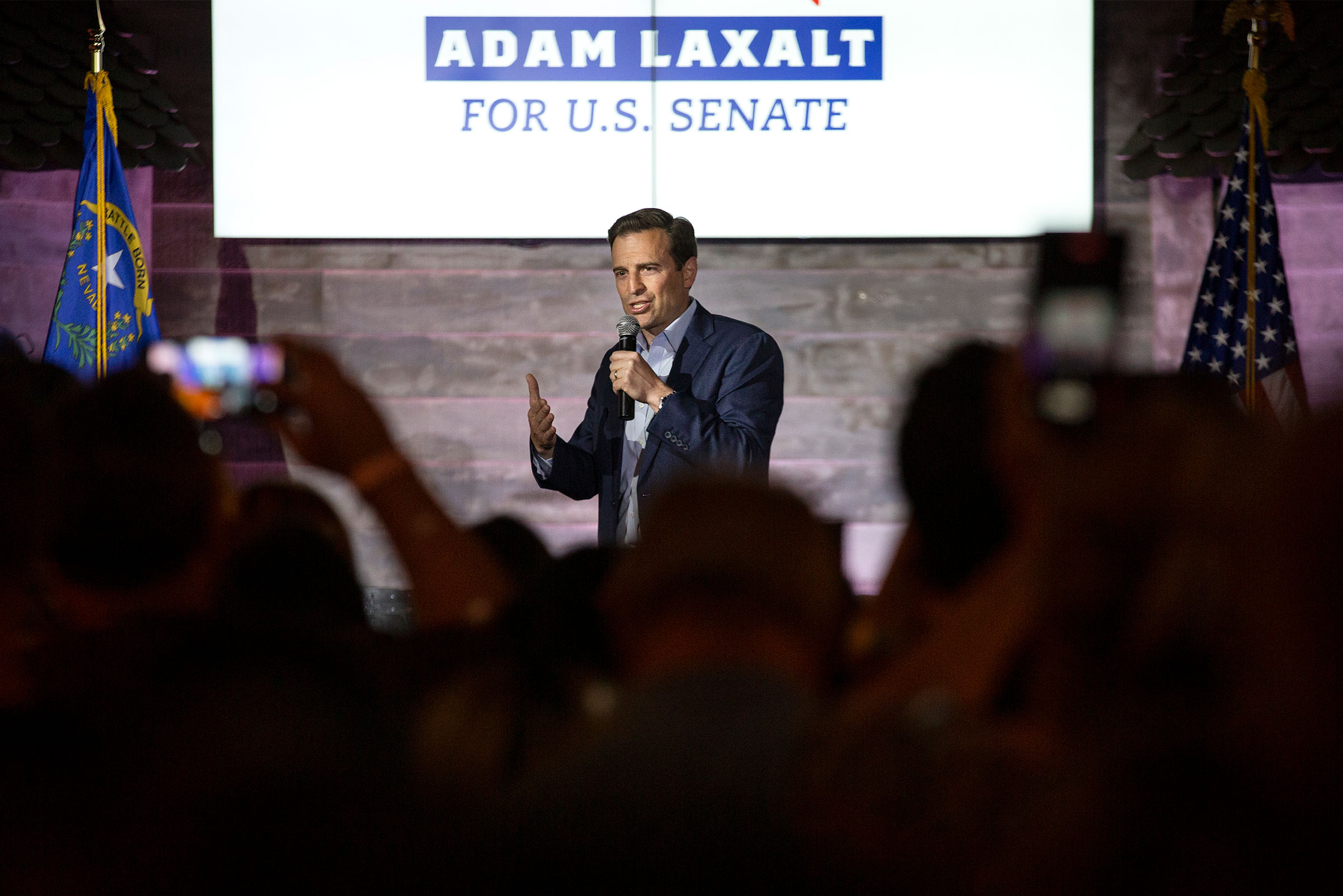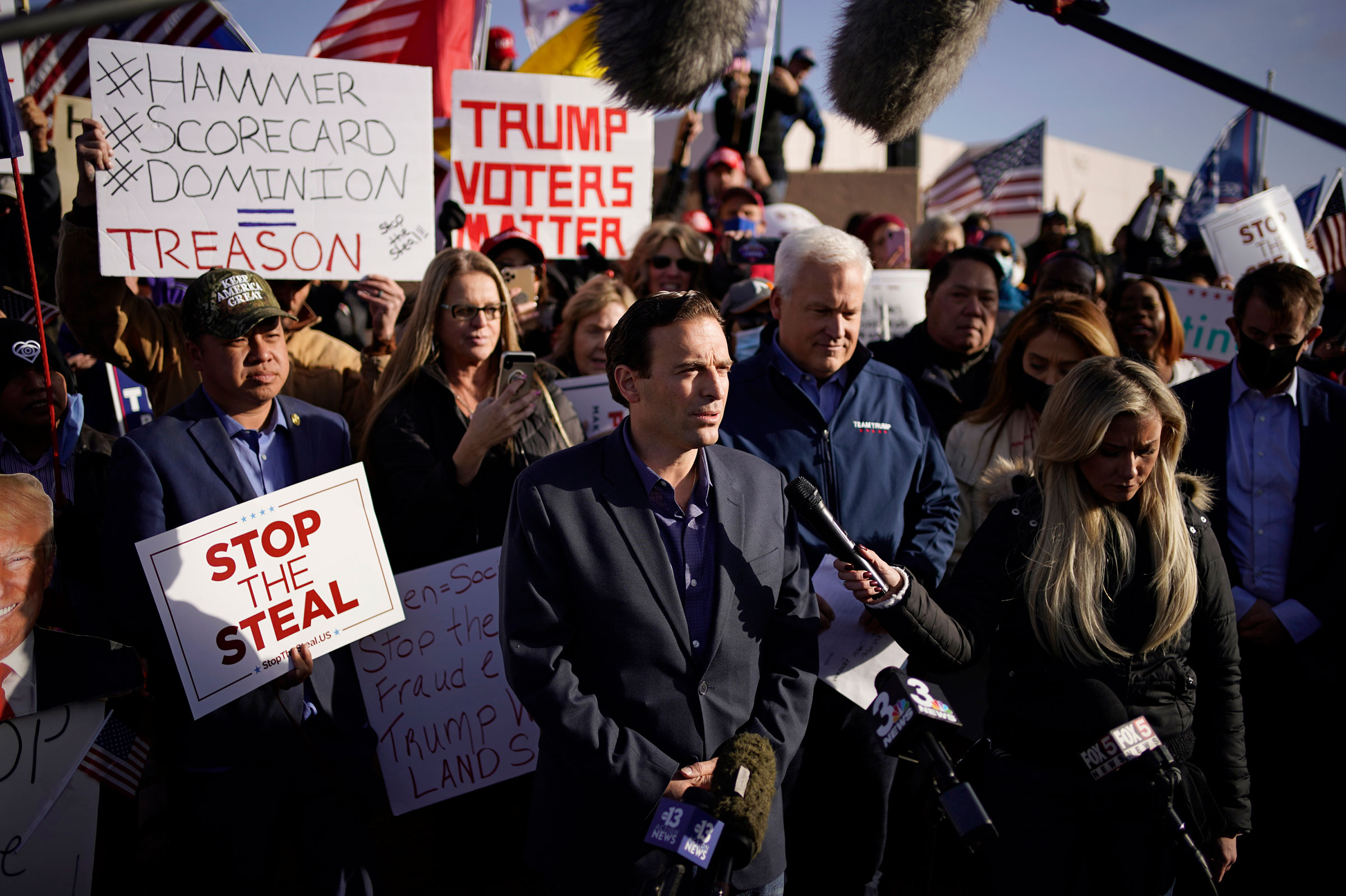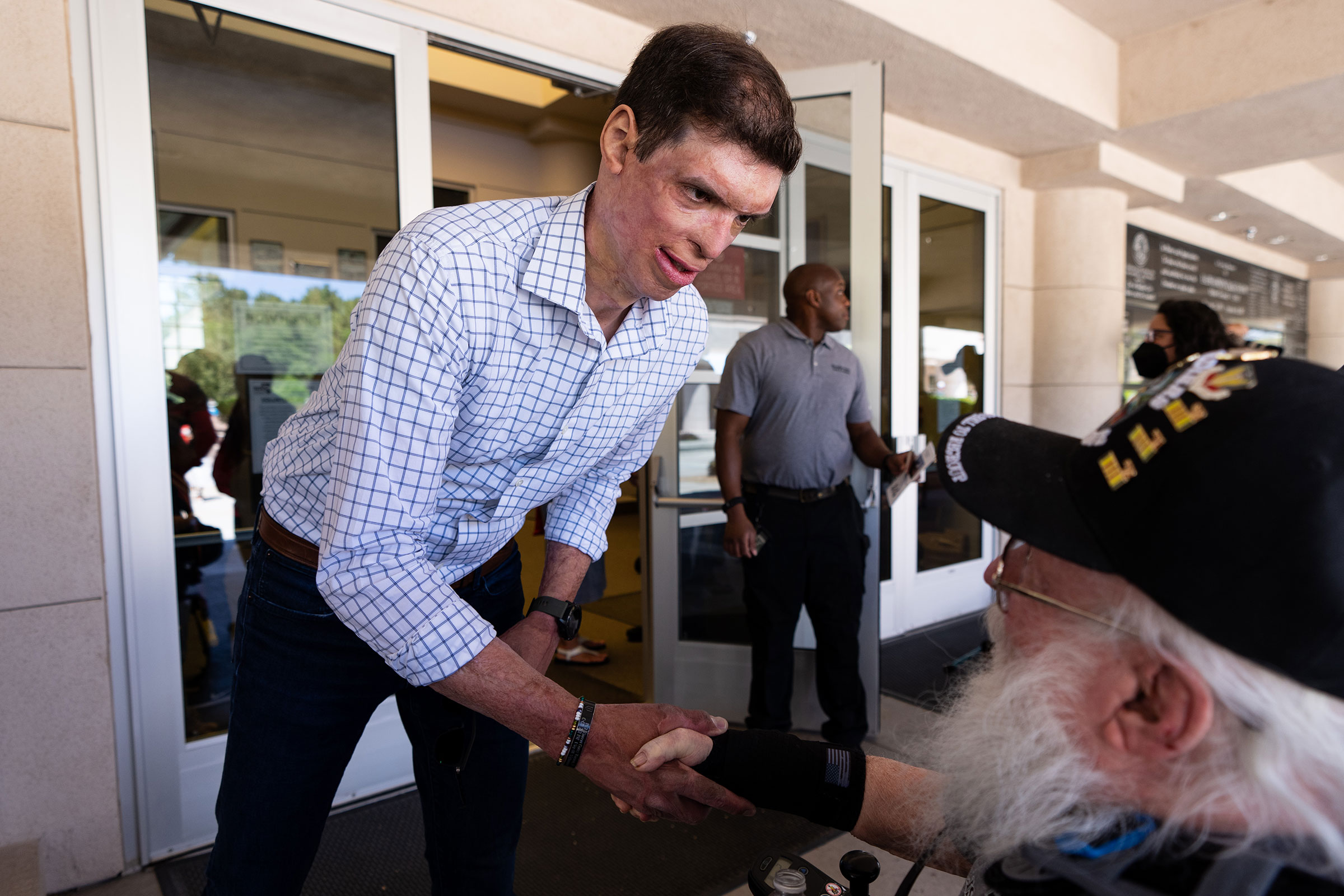
Last August, Donald Trump made a seemingly low-risk bet in the gambling capital of America.
He endorsed Adam Laxalt in Nevada’s primary for a competitive U.S. Senate seat. In many ways, Laxalt was an obvious choice. He not only was a co-chair of Trump’s 2020 campaign in Nevada, he was one of the most prominent voices supporting efforts to overturn Joe Biden’s election victory. He’s also a descendant of GOP royalty, with a grandfather, Paul Laxalt, who was a governor and U.S. Senator for Nevada, and a father, Pete Domenici, who was a U.S. Senator for New Mexico until 2009. Laxalt, a former state attorney general, had nearly a 40-point lead in the polls, leaving many to believe he was the only viable candidate to take on the Democratic incumbent, Catherine Cortez Masto.
“He is strong on Secure Borders and defending America against the Radical Left,” Trump said in a statement. “Adam has my Complete and Total Endorsement!”
But with less than two weeks until the June 14 primary, Trump’s bet has turned into more of a crap shoot.

That’s because of Sam Brown, a retired Army Captain whose face bears the scars of an IED ambush in Afghanistan, who has managed to turn the race into one of the most competitive GOP primaries in the nation. Running something of an insurgent campaign, Brown has found success portraying Laxalt’s support from GOP power players like Trump, Florida Gov. Ron DeSantis, and Sen. Ted Cruz of Texas as a sign that he’s too entrenched in a party that could use some fresh blood.
“Working-class Nevadans and Americans need someone who will be a champion for them in D.C.,” Brown tells TIME. “The career politicians have served themselves long enough.”
Last month, in a striking blow to Laxalt’s campaign, the Nevada Republican Party endorsed Brown in the eight-way primary. Brown has also won several Republican straw polls, including in Clark County, the largest in the state. And he’s raised more than a million dollars in each of the last three fundraising quarters. “That doesn’t sound like a lot for many states, but in Nevada, that’s a lot of money,” Jon Ralston, an expert on Nevada politics and the CEO of The Nevada Independent, a news site, tells TIME.
While Laxalt has still raised more, Brown has picked up four times as many small dollar donations and has spent more on television advertising. There are signs that Laxalt’s supporters are getting nervous. The powerful conservative political action fund Club for Growth is spending nearly $850,000 to run attack ads against Brown until the primary. “You don’t come in and start spending a fortune against someone unless the guy you’re supporting is worried,” says Ralston.
The tightening race is a sign of the shifting political dynamics in Nevada, where the Republican grassroots is thirsty for an outsider. Democrats currently control the governor’s mansion, the statehouse, and both senate seats. (Cortez Masto took over her seat in 2017 from Democrat Harry Reid, who held it for 30 years.)
While Biden won Nevada in 2020, he and his party are now struggling with low approval ratings. National Republicans see a strong opportunity to turn that blue seat red, and many agree with Trump that Laxalt is their best shot.
“There’s a lot of institutional roadblocks against Sam Brown,” says a Republican consultant who has worked with Brown’s campaign and requested anonymity to speak more freely. “Despite all that, he’s still breaking through. I think that shows that there’s something happening in Nevada.”
A loyal MAGA foot soldier
Laxalt, 43, was born in Reno, but he grew up mostly in the Washington, D.C. area. He attended a private school in Alexandria, Virginia, and went on to earn both a bachelor’s degree and a law degree from Georgetown University. After graduating, he worked in the Bush administration for John Bolton, who was an undersecretary of state at the time, and then for U.S. Senator John Warner of Virginia. He also served in the Navy’s JAG Corps, with stints in Italy and Iraq. In 2014, Laxalt left Washington for Reno, where he joined a law firm and ran for attorney general—and won. He held that office until 2018, when he lost a bid for governor to Democrat Steve Sisolak.
In 2020, Laxalt co-chaired Trump’s re-election campaign in the pivotal swing state. He proved himself to be a loyal MAGA foot soldier, trying to block the state from counting mail-in ballots from Clark County, which includes Democratic-leaning Las Vegas. After Biden was declared the state’s winner, Laxalt spread conspiracy theories about the outcome, claiming without evidence that there was widespread voter fraud in Nevada. He then tried to get the election results tossed out.

“There’s no question they rigged the election,” Laxalt said last August. Indeed, he has already gestured that he might preemptively challenge the 2022 election outcome. Over the last year, Nevada has expanded mail voting by sending all eligible registered voters a ballot in the mail. Laxalt has lambasted absentee ballots as rife with fraud, even though there’s no evidence that the voting method comes with additional security risks.
While Laxalt’s efforts earned him Trump’s loyalty, and helped him draw the support of other GOP heavy hitters, Brown and others argue he’s a flawed candidate who can’t win in November.
“He’s his own problem,” Brown says. “Nevadans had a chance to elect him in 2018 for governor and we soundly rejected him. He was the second worst-performing Republican in 2018 on a statewide basis. People don’t trust him and are not enthusiastic about voting for him. I don’t think that he’s capable of running a general election here again.”
Until recently, though, few in Nevada thought Republicans had a realistic alternative to Laxalt. But then Brown burst onto the airwaves through a stirring 30-second television ad that told a compelling story.
In the ad, as on the campaign trail, Brown explains how he was severely injured in Afghanistan, when he was hit with an IED and nearly burned to death during an ambush from the Taliban. Today, his scarred face conveys a message of sacrifice and resilience. “After 30 surgeries, years of recovery, turns out, I’m hard to kill,” he says in the ad with a slight smile.
Brown, 38, was born in Arkansas into a military family. Both his father and a brother also served in Afghanistan. Another brother fought in Iraq. Brown recalls his father telling him he couldn’t afford to send him to college and encouraging him to apply to a military academy. He was accepted into West Point and later joined the Army.
He had only been in Afghanistan for 65 days until the fateful attack. His battalion was the target of an ambush. They faced indirect mortar fire and machine guns from villages to their east and west, he explains. He was called in for backup, and on his way to the attack, his tank was hit with an explosive. “I gave up the will to live as I was burning to death there,” he says. “I fought it as long as I could, and I couldn’t do it.”
Then, one of his fellow soldiers came and saved him. After that, he was sent back to Fort Sam Houston in San Antonio, where he spent three years recovering. It’s an experience, he says, that led to an epiphany. “We live in a culture where people are afraid of suffering. If we all run away from it, then no one’s there to give us hope.
“So how does that impact me politically?” he continues. “I believe that my life is here to serve others.”
“How do you run against Brown?”
While convalescing in Texas, Brown made his first bid for elected office in 2014 unsuccessfully seeking a state House seat. He moved to Reno four years later to work in an Amazon warehouse. There, he raised a family, started a business to provide healthcare services to veterans, and eventually laid the groundwork for his Senate bid.
His message as an outsider with a proven record as a fighter seems to be resonating. In March, one poll had him down by 38 points. Two weeks ago, another one had him 15 points behind. His campaign says its internal polling has him closer still.
The Laxalt campaign has attacked Brown as an opportunist. “Sam Brown is a carpetbagging political tourist who only moved to Nevada because he lost a Texas state assembly primary,” John Burke, Laxalt’s communications director, tells TIME.
The campaign has also tried to discredit Brown’s message of rising from humble origins to serve the common good. “He comes from a billionaire family that started two different NFL franchises in Ohio,” Burke says.
Brown’s great grandfather was Paul Brown, who was a co-founder of the Cleveland Browns, and the team’s first coach. He also helped found the Cincinnati Bengals. The Brown campaign says that Paul’s fortune never trickled down to his immediate family but rather a distant relative.
“He is so desperate for the perks of power that he would lie about me and my family,” Brown says of Laxalt.
Amid the political attacks, policy differences have rarely come up. Both Laxalt and Brown are firmly against abortion rights and stricter gun restrictions, and they each want to cut federal spending.

While Laxalt has established himself as an unabashed Trump acolyte, Brown isn’t exactly a Trump critic. “I’m a big supporter of the America First agenda,” he says. In fact, he wouldn’t say in an interview that Biden was legitimately elected president. “I believe that Joe Biden is currently sitting in the White House and that people like Adam Laxalt, who claim to have insurmountable evidence, have failed to deliver that to the public in a way that is beyond a shadow of a doubt.”
For primary voters, the race may come down more to questions of identity—and the brand of politics they think has a better chance of defeating Cortez Masto in November.
The incumbent is widely seen as vulnerable, in part due to Biden’s lackluster approval rating in the state. According to FiveThirtyEight, she’s voted with the White House 95% of the time. Cortez Masto also hasn’t made herself visible enough in the state, pundits argue. “She’s a work horse, not a show horse,” Ralston says. “She often drives her supporters and Democratic Party strategists nuts because she hasn’t been out there doing things.”
But some Republican sources in Nevada argue Laxalt would be an easier opponent for Cortez Masto to defeat, given that his MAGA bona fides would likely alienate moderates and independents who voted against Trump in 2020.
“If I’m on Masto’s team, I would want Laxalt to get the nomination only because that’s a playbook I know,” says the GOP consultant. “That’s the playbook we’ve run before. It’s safe. We know how to do it. How do you run against Brown? They’ve got to come up with a new strategy and a new message.”
While Laxalt is a known quantity, Brown would be more of a leap into the unknown for Republicans. That sense of unpredictability is part of what has excited Brown’s supporters, and might be precisely what helps him deliver one of the biggest primary upsets of the season.
“I’m looking to be a principled leader. Someone who wants to help our country move forward,” Brown says. “We don’t need more of the same.”
More Must-Reads from TIME
- Introducing the 2024 TIME100 Next
- The Reinvention of J.D. Vance
- How to Survive Election Season Without Losing Your Mind
- Welcome to the Golden Age of Scams
- Did the Pandemic Break Our Brains?
- The Many Lives of Jack Antonoff
- 33 True Crime Documentaries That Shaped the Genre
- Why Gut Health Issues Are More Common in Women
Contact us at letters@time.com